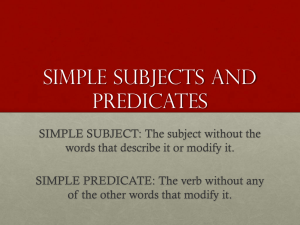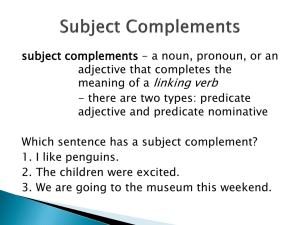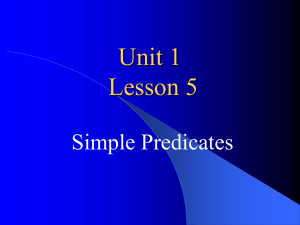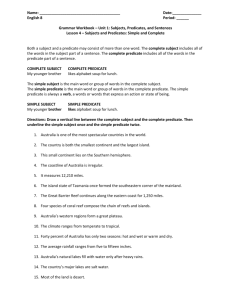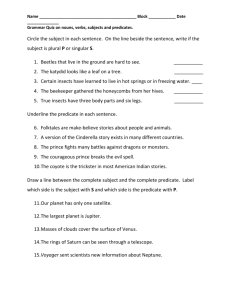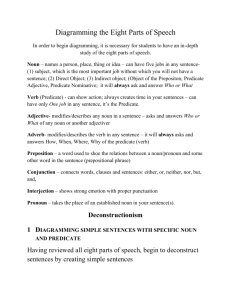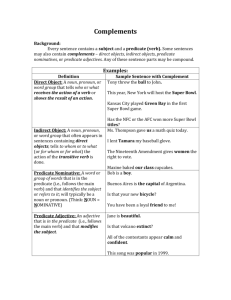PREDICATE AND PREDICATOR Predicate Predicate is any word
advertisement
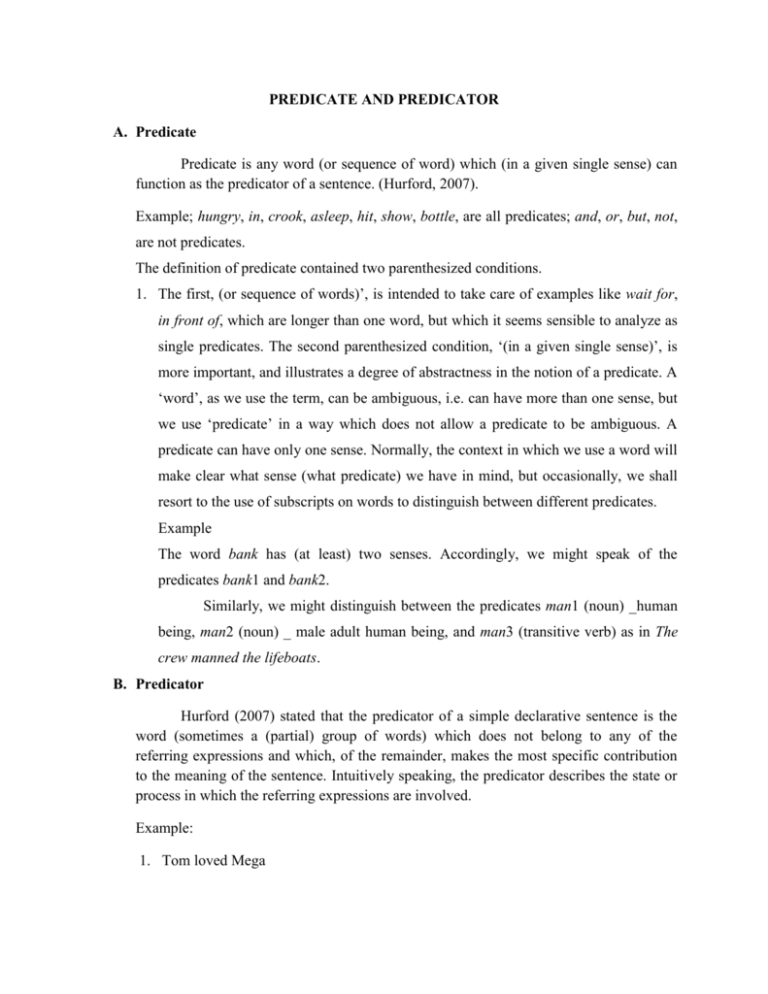
PREDICATE AND PREDICATOR A. Predicate Predicate is any word (or sequence of word) which (in a given single sense) can function as the predicator of a sentence. (Hurford, 2007). Example; hungry, in, crook, asleep, hit, show, bottle, are all predicates; and, or, but, not, are not predicates. The definition of predicate contained two parenthesized conditions. 1. The first, (or sequence of words)’, is intended to take care of examples like wait for, in front of, which are longer than one word, but which it seems sensible to analyze as single predicates. The second parenthesized condition, ‘(in a given single sense)’, is more important, and illustrates a degree of abstractness in the notion of a predicate. A ‘word’, as we use the term, can be ambiguous, i.e. can have more than one sense, but we use ‘predicate’ in a way which does not allow a predicate to be ambiguous. A predicate can have only one sense. Normally, the context in which we use a word will make clear what sense (what predicate) we have in mind, but occasionally, we shall resort to the use of subscripts on words to distinguish between different predicates. Example The word bank has (at least) two senses. Accordingly, we might speak of the predicates bank1 and bank2. Similarly, we might distinguish between the predicates man1 (noun) _human being, man2 (noun) _ male adult human being, and man3 (transitive verb) as in The crew manned the lifeboats. B. Predicator Hurford (2007) stated that the predicator of a simple declarative sentence is the word (sometimes a (partial) group of words) which does not belong to any of the referring expressions and which, of the remainder, makes the most specific contribution to the meaning of the sentence. Intuitively speaking, the predicator describes the state or process in which the referring expressions are involved. Example: 1. Tom loved Mega Love is the predicator and describes the process in which the two referring expressions Tom and Mega are involved. 2. Sinta was waiting for the city bus Waiting for is the predicator and describes the process involving Sinta and the city bus. Notice: the verb be in its various forms (is, was, are, were, am) is not the predicator in any example sentence that we have seen so far. Strip away referring expressions and the verb be (and possibly other elements) to identify the predicators in the following sentences: I am hungry Joe is in San Francisco The predicators in sentences can be of various parts of speech: Adjectives ( red, asleep, hungry) Verbs (write, stink, place), Prepositions (in, between, behind), Nouns (crook, genius). Notice: Conjunctions (and, but, or) and articles (the, a) cannot serve as predicators in sentences. EXAMPLE: John Milton Wrote Paradise Lost in the sixteen fifties. Syntactically, this sentence looks like this: S NP noun: John Milton |VP +-- verb: wrote +-- NP +-- NP | +-- noun: Paradise Lost | +-- PP +-- preposition: in +-- NP +-- determiner: the +-- noun: sixteen fifties The role of predicator, illustrated above, and the role(s) of argument(s), played by the referring expression(s). Example: 1. Joko is Indonesian The predicator is Indonesian and the argument is Joko 2. The police killed Paiman The predicator is the police and the argument is Paiman C. Degree in Predicate The degree of a predicate is a number indicating the number of arguments it is normally understood to have in simple sentences. 1. One degree Example: Risky is asleep. Asleep is a predicate of degree one (often called a one-place predicate) Tom loved mega. Love (verb) is a predicate of degree two (a two-place predicate) 2. Two degree Two degree predicates is a verb that is understood most naturally with just two arguments, one as its subject, and one as its object, is a two-place predicate. Example a. In Melly hit the rabbit, hit is a two-place predicate. It has two arguments: Melly, as subject and, the rabbit, as direct object. 3. Three degree D. The Distinction of Predicates and Referring Expressions The term ‘predicate’ and ‘predicator’ are terms of quite different sorts. The term ‘predicate’ identifies elements in the language system, independently of particular example sentences. Thus, it would make sense to envisage a list of the predicates of English, as included, say, in a dictionary. The term ‘predicator’ identifies the semantic role played by a particular word (or group of words) in a particular sentence.(Hurford, et al., 2007) In this way, it is similar to the grammatical term ‘subject’: one can talk of the subject of a particular sentence, but it makes no sense to talk of a list of ‘the subjects of English’: similarly, one can talk of the ‘predicator’ in a particular sentence, but not list ‘the predicators of English’. A simple sentence only has one predicator, although it may well contain more than one instance of a predicate. Example A sexy, beautiful stranger entered the saloon This sentence has just one predicator, enter, but the sentence also contains the words sexy, beautiful, stranger, and saloon, all of which are predicates, and can function as predicators in other sentences, e.g. Jane is sexy, She is beautiful, She is a stranger, and That ramshackle building is a saloon. The distinction between referring expressions and predicates is absolute. Svenonius (1996 ) he stated that there is not a continuum running from proper names at one end, through ‘borderline cases’ to verbs and prepositions at the other. Either an expression is used in a given utterance to refer to some entity in the world or it is not so used. There are some phrases, in particular indefinite noun phrases that can be used in two ways, either as referring expressions, or as predicating expressions.

